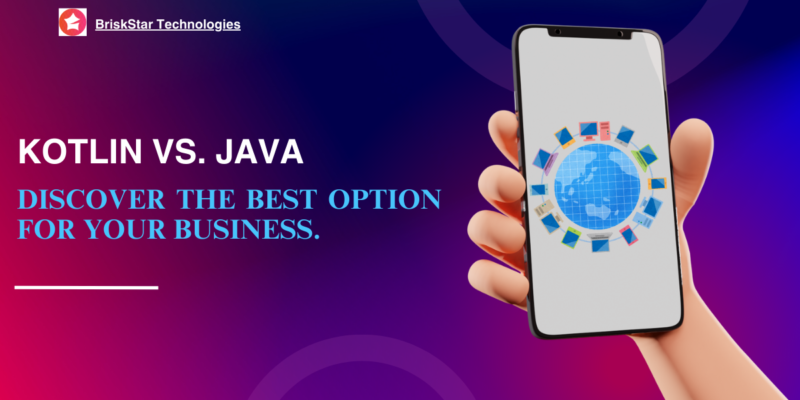
As a professional Android app developer, you’re constantly faced with the dilemma of choosing the right programming language for your projects. Kotlin vs Java are two of the most popular options, and both have their own strengths and weaknesses. In this article, we’ll delve into the differences between Kotlin and Java, and help you decide which one is better suited for your business needs.
What is Kotlin?
Kotlin is a modern, statically typed programming language developed by JetBrains. It’s designed to be more concise and safe than Java, with a focus on interoperability with existing Java code. Kotlin was officially adopted by Google as an official Android development language in 2017, and has since become a popular choice for Android app development.
What is Java?
Java is a widely-used, object-oriented programming language developed by Sun Microsystems (now owned by Oracle). It’s known for its platform independence, making it a popular choice for developing cross-platform applications. Java is also the primary language for Android app development, with most Android apps built using Java.
Key Differences between Kotlin vs. Java
Here are some key differences between Kotlin and Java that can help you decide which one is better for your business:
- Syntax
Kotlin has a more concise syntax than Java, with fewer lines of code required to achieve the same result. This makes it easier to write and maintain code.
- Null Safety
Kotlin has built-in null safety features, which prevent null pointer exceptions at runtime. This makes it easier to write safe and reliable code.
- Interoperability
Kotlin can seamlessly interoperate with existing Java code, making it easy to integrate with existing projects.
- Coroutines
Kotlin has built-in support for coroutines, which allow for efficient handling of asynchronous operations.
- Error Handling
Kotlin has a more expressive error handling system than Java, making it easier to handle errors and exceptions.
- Performance
Kotlin’s performance is comparable to Java, with some benchmarks showing Kotlin to be slightly faster in certain scenarios.
When to Choose Kotlin
Kotlin is a good choice when:
- You’re looking for a more concise and expressive syntax
- You want to take advantage of null safety features
- You need to integrate with existing Java code
- You’re developing an Android app and want to leverage the latest Android features
- You’re looking for a language with a strong focus on functional programming
- You’re unsure about the long-term viability of Kotlin
When to Choose Java
Java is a good choice when:
- You’re already familiar with the language and its ecosystem
- You need to develop a cross-platform application
- You’re working on a legacy project that requires Java compatibility
- You’re looking for a language with a large community and plenty of resources
- You’re unsure about the long-term viability of Kotlin
Benefits of Using Kotlin
Here are some benefits of using Kotlin:
- Improved Code Readability: Kotlin’s concise syntax makes it easier to read and maintain code.
- Faster Development: Kotlin’s concise syntax and built-in null safety features make it easier to develop applications quickly.
- Better Error Handling: Kotlin’s more expressive error handling system makes it easier to handle errors and exceptions.
- Improved Security: Kotlin’s built-in null safety features help prevent null pointer exceptions at runtime.
- Better Support for Functional Programming: Kotlin’s strong focus on functional programming makes it easier to write concise and efficient code.
Benefits of Using Java
Here are some benefits of using Java:
- Large Community: Java has a massive community of developers, which means there are plenty of resources available.
- Cross-Platform Compatibility: Java is platform-independent, making it easy to develop applications that run on multiple platforms.
- Legacy Support: Java has been around for a long time, which means there are many existing libraries and frameworks that can be used.
- Familiarity: Many developers are already familiar with Java, which makes it easier to learn and use.
- Better Support for Multi threading: Java has built-in support for multi threading, which makes it easier to write efficient and scalable code.
Conclusion
In conclusion, both Kotlin and Java are powerful programming languages with their own strengths and weaknesses. When choosing between the two, consider your business needs and goals. If you’re looking for a more concise and expressive syntax, null safety features, and interoperability with existing Java code, Kotlin may be the better choice. If you’re already familiar with Java or need to develop a cross-platform application, Java may be the better choice.
About BriskStar Technologies
BriskStar Technologies is a leading provider of professional Android app development services. With a team of experienced developers and designers, we help businesses build high-quality, engaging Android apps that drive results. Whether you’re looking to build a custom app or migrate an existing app to Kotlin or Java, we’re here to help.
Get in Touch
If you’re ready to take your Android app development project to the next level, get in touch with us today. We’d be happy to discuss your project goals and provide a customized solution that meets your business needs.










